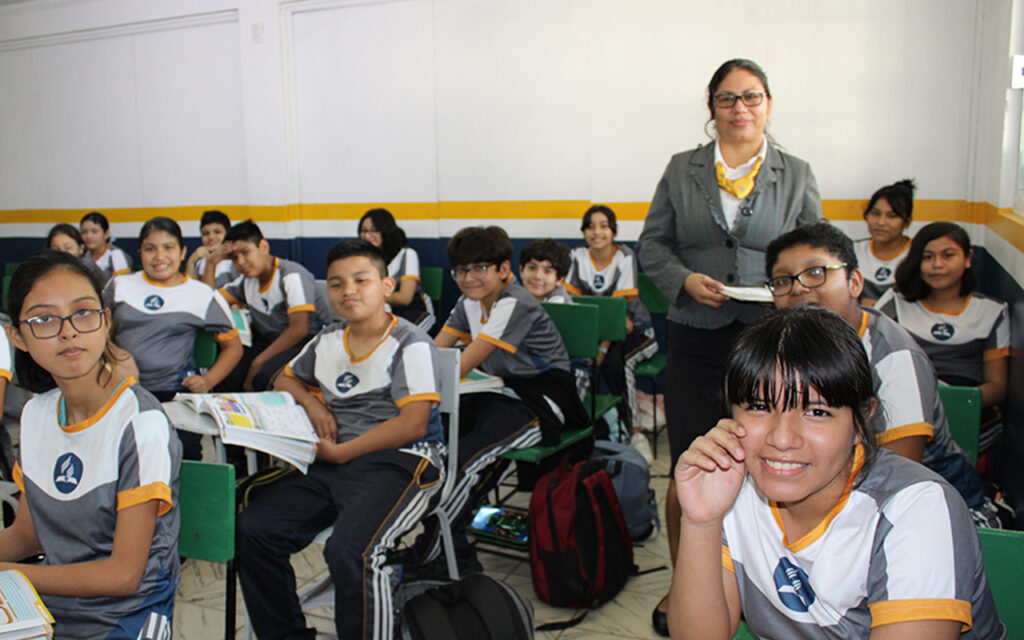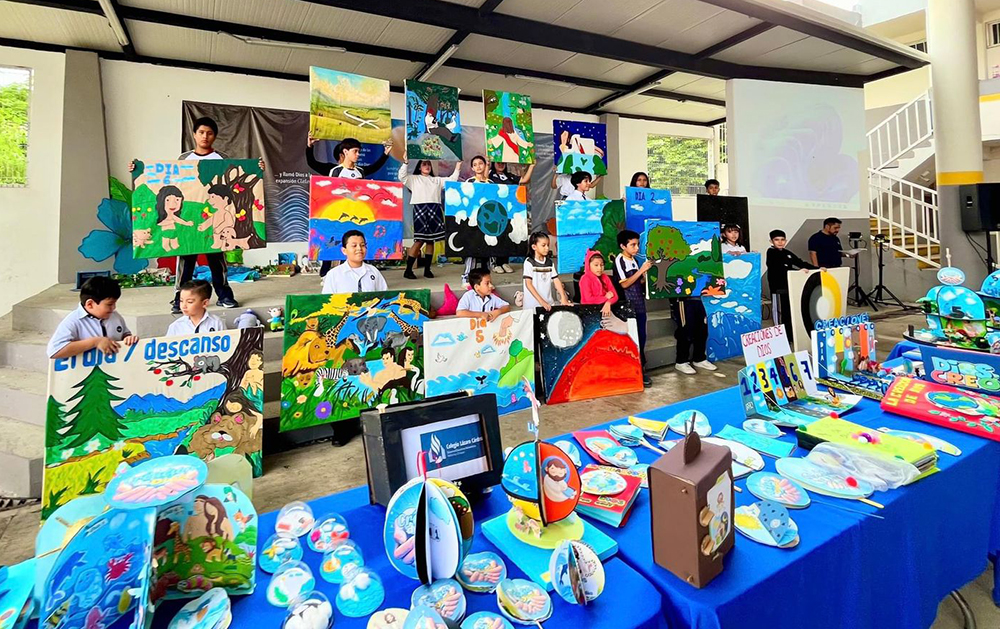Motivating Young Minds to Seek Truth: The IAD’s Commitment to Adventist Education
Shaping future leaders through faith, learning, and service across Inter-America.
September 23 | Miami, Florida, United States | Faye Patterson for Journal of Adventist Education
Raised by parents who loved God, Lorena1 and her three siblings grew up in a home mindful of Christian values. The family gathered at the local Baptist church every Sunday and participated in its programs. However, no one in the family had committed their lives to Christ through baptism.
That all began to change for Lorena when she enrolled in an Adventist university in a nearby city. Here, Lorena witnessed the passion of other young people following Jesus and found herself fascinated by the energy and diversity of youthful worship. Immersed in a culture of spiritual discovery, she engaged in activities that encouraged reflection, prayer, and service through off-campus missionary work.
While surrounded by these opportunities, Lorena had a personal encounter with God. The clarity and direction she had long sought became tangible, and she discovered her calling to serve the church and share Christ’s message of salvation—a realization that gave her life a new sense of value. Lorena’s story is one of many that illustrates how Adventist education motivates young people to seek the truth.

Student enrollment in Adventist schools across Inter-America has grown 42 percent in five years, highlighting the demand for faith-based, values-driven education. [Photo: Inter-American Division]
For more than 150 years, Adventist education has brought young people from all walks of life closer to Jesus, just as it did with Lorena. These schools nurture the whole person, combining academic excellence with moral discernment. They invite students to live out God’s love and walk through life with a purpose beyond themselves. As Proverbs 22:6 says, “Start children off on the way they should go, and even when they are old, they will not turn from it” (NIV).2
The Inter-American Division (IAD)3 student population has increased by 42 percent over the past five years, while new primary educational institutions have expanded by seven percent.4 Adventist schools in this diverse region encourage young people to pursue knowledge, develop character, and commit to a life of service. The rise in enrollment reflects the appeal of an educational model that combines academic achievement with moral principles.
Education That Continues To Shape Lives
Adventist schools across Inter-America have expanded to meet the demand for education that celebrates Christian lifestyles and principles and offers an uncompromising, rigorous academic curriculum. These schools guide students to live out their values and take responsibility for their communities. They seek to shape individuals who live by faith, act with integrity, serve others, and make meaningful contributions through mentoring, health initiatives, and advocacy for justice and hope.
Programs rooted in the Adventist mission turn belief into action. Small groups, baptismal classes, Bible clubs, and community-outreach projects share the gospel within neighborhoods and beyond. As students study Scripture, they gain a clearer understanding of its teachings and apply them in ways that create lasting change. These experiences strengthen their connection to Christ and reinforce core values like honesty, compassion, and respect.

As part of IAD’s Intercultural Mission Project, elementary students participate in sharing God’s message within their local communities. [Photot Inter-American Division].
Elementary and secondary students also participate in local projects and share God’s message through creative programs designed to connect them with their communities. Pastors work closely with schools to guide these initiatives, helping new believers strengthen their faith and deepen their commitment to Christ.
The Baptism Caravan: A Special Kind of Harvesting
Throughout this quinquennium, the Baptism Caravan project has united educational institutions across the IAD, leading more than 4,500 primary and secondary students, 400 university students, and 400 parents to accept Christ as their Savior.5
The Baptism Caravan supports Adventist education’s mission by identifying and nurturing future leaders while highlighting the family’s essential role in God’s redemptive plan. By encouraging decisions for Christ by entire households, the program underscores the family’s decisive influence in sharing the message of salvation.

Through the Baptism Caravan project, students and their families made the decision to follow Jesus and were baptized. [Photo: Inter-American Division]
Programs like “The Family, God’s Perfect Plan” invite non-Adventist parents to study Scripture, guiding them toward decisions for Christ that transform their homes. These efforts have strengthened family bonds through seminars and workshops, sparking renewed interest in Bible study. As a result, 65 percent of participating families report improved prayer habits and deeper connections within their households. 6
Events such as Creation Week, Inter-American Week of Prayer, and Prayer Day bring schools and families together to celebrate God’s plan of redemption. These gatherings have strengthened community ties and helped students understand their role as Christ’s followers. Student participation in these events has risen by 80 percent during the quinquennium, highlighting the lasting impact of collective worship and intentional discipleship. 7
Adventist universities also address broader community needs through eight centers of influence. Throughout the IAD, programs like A Path to Integral Health focus on wellness by offering underserved communities psychological support and essential resources. These centers enhance living conditions while serving as platforms for sharing the gospel, inviting participants to embrace Christ-centered lives. Collaborations with conferences, unions, and government agencies have expanded their reach and strengthened their regional impact.
A Path to Comprehensive Health engages university students in outreach to unreached areas where they plant churches and build relation ships that create lasting change. Younger students also contribute, leading health-education efforts, organizing local initiatives, and sharing God’s message through creative outreach.

Students from Universidad de Linda Vista in Mexico gather before providing free medical check-ups and services to adults and children in a local community as part of their campus Center of Influence community service. [Photo: Linda Vista University]
Curriculum That Transforms
Adventist education within the IAD seeks to embed biblical values into every facet of the educational experience. A core goal of this effort is to equip teachers with expertise and a forward-thinking Christian pedagogy. Consider neuroeducation9: when approached through the lens of faith, it becomes an essential element of teacher preparation. Educators connect scientific reasoning with biblical principles, incorporating neuroscience concepts like brain plasticity into their methods and lesson plans. Through intentional instruction, they cultivate a mindset that reflects God’s renewing power.
This understanding of the brain’s adaptability aligns with the Adventist philosophy of education, which views learning as a means of restoring God’s image in students. Teachers are urged to create lessons that promote growth in knowledge, skills, and character-building habits, such as perseverance, critical thinking, and spiritual reflection, strengthening students’ faith and readiness for service in this life and eternity.
Throughout the IAD, Adventist educators use innovative teaching strategies, such as project-based methods and flipped classrooms, to involve students in dynamic ways and make learning interactive and engaging. Inspired by Jesus as the Master Teacher, these approaches emphasize collaboration, independence, and problem-solving, capturing His ability to transform lessons and make them relevant.

A class from the Lázaro Cárdenas del Río Adventist School in Reforma, Chiapas Mexico, show their creation-themed paintings , arts and crafts during the recent creation week emphasis across the Chiapas Mexican Union. Students from all grades showed their artistic expression and creativity as part of cementing the biblical story of creation, school faculty said. [Photo: Courtesy of Lázaro Cárdenas del Río Adventist School]
Focused initiatives reinforce this purpose. Certifying 600 school principals, training more than 1,600 educators in denominational history and biblical tenets, and revitalizing the Adventist Virtual Library (BiVA) have provided IAD teachers and students with essential tools to broaden their knowledge and faith.10 These efforts equip students to lead compassionately, serve their communities, and share God’s message with clarity and conviction.
Even amid global challenges, such as the pandemic, Adventist education in the IAD has remained steadfast. Rising enrollment and thousands of baptisms affirm its enduring influence. The vision remains clear: to educate for redemption, to transform lives, and to prepare future generations to fulfill their unique roles as representatives of God’s love.
The Transformative Power of Adventist Research
Adventist education inspires students and teachers to approach new ideas through the lens of faith, addressing real-world challenges while strengthening their relationship with God. This approach goes beyond the classroom, seeking to understand God’s creation, enriching communities, and fostering positive change through knowledge and service.

Hundreds of researchers, educators, and students from Seventh-day Adventist universities across Inter-America gathered online for the 4th International Research Conference, hosted by Colombian Adventist University, to share findings and innovations in Adventist education. [Photo: Colombian Adventist University]
In the IAD, 13 universities drive these initiatives through the Scientific Society, a platform where students and faculty connect creativity with a spiritual focus. The society explores the alignment between science and Adventist values, generating ideas that advance spiritual growth and academic excellence. The universities’ upcoming participation in the 2025 International Congress in Medellín will further demonstrate the global influence of Adventist education and its ability to shape the academic world through faith-guided research.
For Adventist teachers, research is more than an academic endeavor; it is a ministry. As Proverbs 1:5 reminds us, “let the wise listen and add to their learning, and let the discerning get guidance.”
Integrating Technology in Education
Technology is transforming education, and Adventist institutions in the IAD have embraced these innovations to prepare students for the challenges of a changing world. Tools like virtual classrooms, interactive platforms, and digital-management systems have reshaped teaching and learning, making them more flexible and responsive to the needs of both students and educators.

The Adventist Virtual Library offers a range of initiatives for students across primary, secondary, and university schools in the region, including a reading program for younger students. [Photo: Adventist Virtual Library]
IAD seeks to prepare teachers for the digital age in a variety of ways. Educators are trained to incorporate modern methods into their classrooms, fostering environments that encourage critical thinking, inquiry, and professional growth. This training equips students with vital skills for today’s world, such as problem-solving, collaboration, and clear communication, while grounding them in eternal biblical principles.
When guided by the mission of sharing the gospel, technology can equip students to meet future challenges while committing their lives to God’s service. Ellen G. White noted, “Without the influence of divine grace, education will prove no real advantage; the learner becomes proud, vain, and bigoted.” 11
Robotics in IAD Schools
IAD schools have made significant progress in STEM (Science, Technology, Engineering, Mathematics), with robotics as a key area of research and achievement. Schools across the region have developed projects that prepare students to tackle technical challenges in this field. These efforts gained international recognition in 2024 when Colegio Adventista Metropolitano de Panamá [Metropolitan Adventist Academy, Panama] represented Panama at a global robotics competition in the Netherlands. 12

Students from Colegio Adventista Metropolitano de Panamá (Metropolitan Adventist Academy) earned international recognition at a global robotics competition in the Netherlands in June 2024, showcasing technical skill and steadfast faith by competing without compromising their Sabbath observance. [Photo: Facebook]
The significance of this achievement extends beyond the competition itself. Remarkably, 70 percent of the Colegio Adventista Metropolitano de Panamá delegation consisted of non-Adventist students. Even so, the values instilled through Adventist education fostered a collective commitment to principles beyond personal success. By choosing to honor the Sabbath, they exemplified the mission of Adventist education on the global stage.
Looking to the Future
Adventist education in IAD has experienced remarkable growth during this quinquennium, characterized by spiritual renewal and a commitment to academic and moral excellence. Our schools prepare students for life’s challenges and inspire them to live intentionally, lead with conviction, and serve compassionately.
We believe the seeds planted today will yield an eternal harvest. Guided by God’s providence, Adventist education will continue to nurture students who reflect Christian values, inspire hope, and walk the path toward eternity.
Standing at a crossroads of opportunity and challenge, our focus on spiritual growth, educational innovation, and collaboration empowers us to fulfill our mission. As educators, parents, and church leaders, we ensure that Adventist education remains a beacon of hope and transformation in an ever-changing world.

Students from Central American Adventist University in Alajuela, Costa Rica, spend time with local seniors following an activity organized through the university’s Center of Influence. [Photo: Central American Adventist University]
As we look forward to the next quinquennium, we are reminded of the rich blessings God has bestowed upon us in the past. With His guidance, we are called to pursue sustainable growth and to integrate spiritual, academic, and personal development, even as we navigate ongoing challenges and seize new opportunities.
Our commitment is clear: Adventist schools must remain vibrant evangelistic centers, uplifting students and their families in faith. This requires empowering Adventist educators in the IAD through continuous professional development, ensuring they inspire curiosity, foster spiritual growth, and effectively lead the next generation. Addressing educational gaps and supporting student mental health is critical, as we create environments that nurture resilience and recovery.
The strength of our mission lies in collaboration. Strengthening partnerships with parents, churches, conferences, and communities amplifies our impact and unites us in a shared purpose. Our institutional identity must balance academic rigor with a steadfast spiritual emphasis, solidifying Adventist education’s distinctive role in shaping character and preparing students for life’s challenges. Enhancing the partnership between schools and families fosters a wholistic approach that nurtures children at home and in the classroom.
Promoting sustainability through environmental stewardship reflects our commitment to Creation care and sets a powerful example for students and communities. Modernizing facilities ensures safe, effective learning environments while maintaining financial sustainability (e.g., lower energy costs, reduced maintenance, and increased property values).
Finally, inter-divisional collaboration allows us to highlight Adventist education’s unique value globally and affirm its relevance in today’s ever-changing world. As we enter this new quinquennium, we resolve to remain steadfast in our mission, united in faith, and committed to excellence. With God’s continued blessings, we will overcome challenges, capitalize on opportunities, and ensure that Adventist education remains a transformative force in the Inter-American Division.
Faye Patterson, PhD, is the Education director for the Inter-American Division. She also serves as a consultant on The Journal of Adventist Education® Advisory Board.
NOTES AND REFERENCES
- Names used are pseudonyms.^
- Scriptural references in this report are quoted from the New International Versionof the Bible. Holy Bible, New International Version®, NIV® Copyright ©1973, 1978, 1984, 2011 by Biblica, Inc.® Used by permission. All rights reserved worldwide.^
- The territory of the Inter-American Division includes Mexico, Central America, the five northernmost countries of South America (Columbia, Venezuela, Guyana, Surinam, and French Guiana), and the Islands of the Caribbean, including French overseas territories of Saint Barthélemy and Saint Martin; and the Netherlands’ special overseas municipalities of Bonaire, Sint Eustatius, and Saba. See Inter-American Division (2025): https://www.adventist.org/world-church/inter-american/.^
- IAD Education Report data. ^
- ^
- ^
- ^
- Ellen G. White, Fundamentals of Christian Education (Nashville, Tenn.: Southern Publishing Assn., 1923), 42.^
- Neuroeducation is an interdisciplinary field of study that pairs what is known about how the brain processes information with educational best practices. It incorporates disciplines such as psychology, behavioral sciences, biology and neuroscience with educational practice. See Christopher Pappas, “Uniting Neuroscience And Education: The Foundational Principles of Neuroeducation,” eLearning Industry (2024): https://elearningindustry.com/uniting-neuroscience-and-education-the-foundational-principles-of-neuroeducation; K. Pradeep et al., “Neuroeducation: Understanding Neural Dynamics in Learning and Teaching,” Frontiers (2024): https://www.frontiersin.org/journals/education/articles/10.3389/feduc.2024.1437418/full.^
- IAD Education Report data. ^
- Ellen G. White, Christian Education (Battle Creek, Mich.: International Tract Society, 1894), 42.^
- “Five Panamanian Students to Compete in the RoboCupJunior International Tournament,” Impacto Positivo [Positive Impact] (2024): https://somosimpactopositivo.com/en/robocupjunior-international/.^